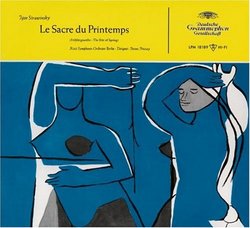| All Artists: Igor Stravinsky, Ferenc Fricsay, RIAS Symphonie-Orchester Title: Igor Strawinsky: Le Sacre du Printemps Members Wishing: 0 Total Copies: 0 Label: Deutsche Grammophon Release Date: 7/12/2005 Genre: Classical Styles: Ballets & Dances, Ballets, Historical Periods, Modern, 20th, & 21st Century, Symphonies Number of Discs: 1 SwapaCD Credits: 1 UPC: 028947754855 |
Search - Igor Stravinsky, Ferenc Fricsay, RIAS Symphonie-Orchester :: Igor Strawinsky: Le Sacre du Printemps
 | Igor Stravinsky, Ferenc Fricsay, RIAS Symphonie-Orchester Igor Strawinsky: Le Sacre du Printemps Genre: Classical |
Larger Image |
CD Details |
CD ReviewsSimply amazing. Marcus K. Maroney | 07/18/2005 (5 out of 5 stars) "If you think an orchestra in the 1950s wouldn't have the 'chops' to play the hell out of Le Sacre like, say, today's Cleveland Orchestra, think again. This performance is ferocious and devastating, with outstanding playing from every section of the RIAS Berlin that rivals today's finest ensembles. Don't let the mono sound be a detraction - the colors of Stravinsky's orchestration are vivid as ever. The only 'problem' with the mono sound is a degree of brightness in loud passages (or, if you like, a lack of dark fullness in those same passages). Many of the tempos are slower than what we usually get today, but the crisp accuracy of the playing makes the effect all the more impressive. Details that usually fly by unnoticed are pronounced and important to the goings-on. Compared to some recent, yawn-inducing (who would have thought this piece could do that?) recordings (i.e., Paavo Järvi and company), this is stunning. Simply put, a recording not only important because of its vintage, but as an interpretation for the ages. The coupled Petrushka is also impressive. I think this the harder score of the two to bring off convincingly, but again, Fricsay's orchestra displays such infectious virtuosity I was transfixed from beginning to end. In this performance, the tempos are slightly quicker than most other recordings (notably the opening motive and its multiple returns and the famed trumpet solo), and the whole affair is a triumph of energy. The first-chair woodwinds and brass are fantastic throughout - distinctively phrased, thrillingly virtuosic." A 5 Star Production, but ....Petrouchka doesn't get to die. RENS | Dover, NH USA | 09/20/2005 (5 out of 5 stars) "I fully agree with the earlier comments. This is an amazing recording in every way: interpretation, execution, and sound. No lover of Stravinky's early ballets should be without it. Sadly, the last three sections of Petrouchka are missing. On this recording the ballet ends with the rowdy dance of "les deguises". This is no accident but a concert version in use at the time. It is hard to imagine Fricsay deliberatly omitting the scenes that bring the drama to its completion, but he chose the version he chose. As it is, we hear a superb Petrouchka that breaks off suddenly and robs us of the pathetic death of Petrouchka and Stravinsky's masterful finale in which the music fades away into into an appalling silence. Nothing but cheers for the Rite of Spring, however, from beginning to end!" A neurotic, no glamour 'Le sacre' that carries quite a charg Santa Fe Listener | Santa Fe, NM USA | 12/09/2008 (5 out of 5 stars) "Before his untimely death in 1963 at the age of 49, Ferenc Fricsay was a star on the DGG label, although not many Americans had heard him live, to my knowledge. His riveting talents justify reissuing almost everything he made, much of it in mono. Here we have one of the most modernist-soudning "Le sacres" on disc, in the sense that not a note is played for glamour or virtuosic showmanship -- the score sounds neurotic, tense, almost harrowing in places. We are hearing Paul Klee's twittering machine drenched in horror. Fricsay was making a virtue of necessity since his RIAS (Radio in the American Sector) orchestra from Berlin was by no means a virtuoso band.
Even if they had been, I imagine Fricsay would still have produced this nerve-wracking interpretation. The roughness in the playing serves his ends, and the musicians dive in with total commitment. I agree with the previous reviewers who say that mono sound shouldn't stand in anyone's way. It's detailed, close up, and not too boxy for that era. 'Petrushka,' shorn of its final scenes, gets the same detailed sonics, but the natural concert-hall ambience puts the percussion and brass to the rear, not a great drawback. Fricsay's interpretation is lean and agitated, as in Le sacre, but of course not nearly so violent. It's a very impressive performance if not quite a must-have, given the plethora of excellent 'Petrushkas' to be had from better orchestras in much finer sound." |
